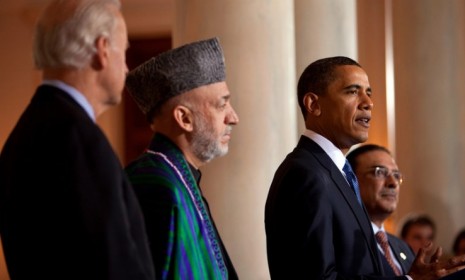4 ways the 2012 election is shaping Obama's foreign policy
In the president's every delicate negotiation, the fate of global security hangs in the balance. But don't forget the elephant in the room: Domestic politics

A free daily email with the biggest news stories of the day – and the best features from TheWeek.com
You are now subscribed
Your newsletter sign-up was successful
In his first term, President Obama notched some impressive achievements on his foreign policy belt. From the spectacular (killing Osama bin Laden), to the managerial (winding down the war in Iraq), Obama is the rare Democrat who heads into a November election bear-hugging foreign policy, a Republican strong point in recent years. But as confident as the White House appears to be, liberal and conservative critics say domestic political considerations are harming America's geopolitical positions. Here, four examples of how Obama's decisions have been affected by electoral considerations:
1. Taking a hard line against Iran
With Republican candidates hammering Obama for being too soft on Iran, the president is under pressure to show that he's taking tough measures to prevent the Shiite regime from developing a nuclear weapon. The administration has unveiled its demands ahead of an important summit with Iran scheduled for Friday, which are so "unilateral" that Iran "will probably find them unacceptable," says the UAE's The National. Obama realizes "staying tough on Iran is a foreign-policy winner" back home, and his demands indicate that he prefers "loud politics" to "quiet progress." As a result, the summit will likely end in "the same type of rhetorical bluster and intransigence" that got the world "into this mess in the first place."
The Week
Escape your echo chamber. Get the facts behind the news, plus analysis from multiple perspectives.

Sign up for The Week's Free Newsletters
From our morning news briefing to a weekly Good News Newsletter, get the best of The Week delivered directly to your inbox.
From our morning news briefing to a weekly Good News Newsletter, get the best of The Week delivered directly to your inbox.
2. Winding down the Afghan war
Obama recently agreed to hand over control of night raids and other special operations to the Afghan army, part of a plan to withdraw American troops by 2014, despite the reported objections of senior U.S. military leaders. The 2014 timetable "is based not on military-operational considerations, but on domestic politics," says Leif Babin at The National Review. The war is unpopular in America, but Afghanistan is nowhere close to being secure, and what is the point of being there "if not to establish peace and deter the possibility of a future war?" Obama's "exit strategy" will eventually "achieve the opposite."
3. Postponing Russian missile talks
In March, Obama told outgoing Russian President Dmitry Medvedev that negotiations over a controversial European missile defense system, which Russia objects to, would have to wait until after the election, when Obama would have "more flexibility." Obama's comments were caught on a hot mic, which led GOP rival Mitt Romney to blast the president for bowing to our "No. 1 geopolitical foe." While the "campaign-year outrage" is overblown, the conversation did raise a "worrisome" question, says Bloomberg in an editorial. "Just how flexible does Obama plan to be with Russia on" missile defense? Obama should provide assurances that he won't cave to Russian "saber-rattling."
A free daily email with the biggest news stories of the day – and the best features from TheWeek.com
4. Urging Europe to bail out Greece
Another conflagration in the European debt crisis could send the U.S. economy tumbling, which is one of Obama's greatest re-election fears. Perhaps that's why he's quietly urging Europe to spend more money to help indebted countries and contain the crisis for good. But Obama's re-election focus blinds him to Germany's concern that bailouts "could lead to rampant inflation and weaken European democracy," says John Kornblum at The New York Times. European-U.S. ties are being strained by Obama's "repeated calls for action," which are only rankling German Chancellor Angela Merkel, who claims Obama "simply does not understand" how hard it is to "find consensus" among the European Union's 27 nations.